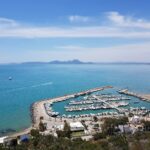Tunisia, with its Mediterranean coastline, rich history, and affordable cost of living, has become an attractive destination for expats, retirees, and investors looking to buy property. Whether you’re seeking a beachfront villa, a modern apartment in Tunis, or a countryside retreat, navigating Tunisia’s real estate market requires careful planning.
This comprehensive guide covers everything you need to know about buying property in Tunisia, including legal requirements, financing options, best locations, and tips for a smooth transaction.
1. Why Buy Property in Tunisia?
Affordable Real Estate Prices
Compared to Europe and North America, Tunisia offers significantly lower property prices. A modern apartment in Tunis can cost between €50,000 and €150,000, while coastal properties in Hammamet or Sousse range from €80,000 to €300,000 for a villa.
Favorable Climate & Lifestyle
With over 300 days of sunshine per year, Tunisia is ideal for retirees and digital nomads. The Mediterranean diet, low healthcare costs, and relaxed pace of life make it a great place to settle.
Investment Potential
Tourism-driven areas like Djerba and Monastir offer strong rental yields, especially for short-term holiday lets. The government also encourages foreign investment through incentives like the “Tourist Residence” program.
2. Can Foreigners Buy Property in Tunisia?
Yes, but with some restrictions:
For Non-Residents
- Foreigners can buy apartments and villas in designated tourist zones (e.g., Hammamet, Sousse, Djerba).
- Agricultural land is restricted unless purchased through a Tunisian company.
- A “Tourist Residence Permit” allows non-residents to own property but does not grant residency.
For Residents & Dual Nationals
- Tunisian residents (with a long-term visa) can buy property more freely.
- Dual nationals (Tunisian + another passport) have full ownership rights.
Legal Requirements
- A notary must oversee the transaction.
- A property title check is mandatory to avoid disputes.
- Foreign buyers must obtain approval from the Tunisian government (a standard process taking 2-3 months).
3. Best Places to Buy Property in Tunisia
1. Tunis (Capital City)
- Best for: Expats, professionals, and investors.
- Average Price: €1,500–€3,000 per m².
- Neighborhoods to Consider:
- La Marsa (upscale, coastal)
- Lac de Tunis (modern, business district)
- Sidi Bou Said (charming, historic)
2. Hammamet (Coastal Resort Town)
- Best for: Retirees and holiday home buyers.
- Average Price: €1,200–€2,500 per m².
- Why Buy Here? Golf resorts, beaches, and a thriving expat community.
3. Sousse (Historic & Tourist Hub)
- Best for: Investors and long-term rentals.
- Average Price: €1,000–€2,000 per m².
- Key Areas: Port El Kantaoui (luxury marina) and Sousse Medina (traditional).
4. Djerba (Island Paradise)
- Best for: Beach lovers and digital nomads.
- Average Price: €800–€2,000 per m².
- Perks: Tax-free zone, low cost of living, and year-round tourism.
5. Bizerte (Hidden Gem)
- Best for: Budget buyers and nature lovers.
- Average Price: €700–€1,500 per m².
- Why Consider It? Less crowded, scenic coastline, and lower prices.
4. Financing Your Tunisian Property Purchase
Cash Purchase (Most Common)
- Many sellers prefer cash deals.
- No mortgage restrictions for foreigners, but local banks offer limited financing.
Mortgages for Foreigners
- Tunisian banks (e.g., BIAT, STB, BT) offer mortgages at 4–7% interest.
- Requirements:
- 30–50% down payment.
- Proof of income (local or foreign).
- Residency permit (sometimes required).
Developer Financing
- Some real estate developers offer installment plans (e.g., 20% down, rest over 2–5 years).
International Financing
- Expats may secure loans from European banks if they have assets abroad.
5. Step-by-Step Buying Process
Step 1: Define Your Budget & Needs
- Decide on location, property type, and must-have features.
Step 2: Hire a Local Real Estate Agent
- A reputable agent helps navigate legalities and negotiates prices.
Step 3: Property Search & Visits
- Visit shortlisted properties and verify ownership documents.
Step 4: Make an Offer & Sign a Preliminary Contract
- A “Compromis de Vente” (pre-sale agreement) is signed with a deposit (usually 10%).
Step 5: Due Diligence & Government Approval
- A notary checks the property title.
- Foreign buyers must obtain government approval (takes 2–3 months).
Step 6: Final Sale & Registration
- Sign the final deed (“Acte Authentique”) at the notary’s office.
- Pay registration fees (1–2.5% of property value).
6. Hidden Costs & Taxes
- Notary Fees: 1–2% of property value.
- Registration Tax: 1–2.5%.
- Agency Fees: 2–5% (if using a realtor).
- Annual Property Tax: 0.1–0.5% of cadastral value.
7. Tips for a Smooth Purchase
✅ Work with a Lawyer – Ensures legal compliance.
✅ Verify Ownership – Avoid disputed properties.
✅ Negotiate the Price – Bargaining is common.
✅ Consider Resale Potential – Tourist areas have better liquidity.
8. Conclusion: Is Buying Property in Tunisia Right for You?
Tunisia offers affordable real estate, a sunny climate, and a relaxed lifestyle, making it ideal for retirees, expats, and investors. While legal restrictions exist for foreigners, the process is straightforward with the right guidance.
By choosing the right location, securing financing, and following legal steps, you can find your dream home in Tunisia—whether it’s a beach villa, a city apartment, or a countryside retreat.
Ready to start your property search? Contact a local real estate expert today!



